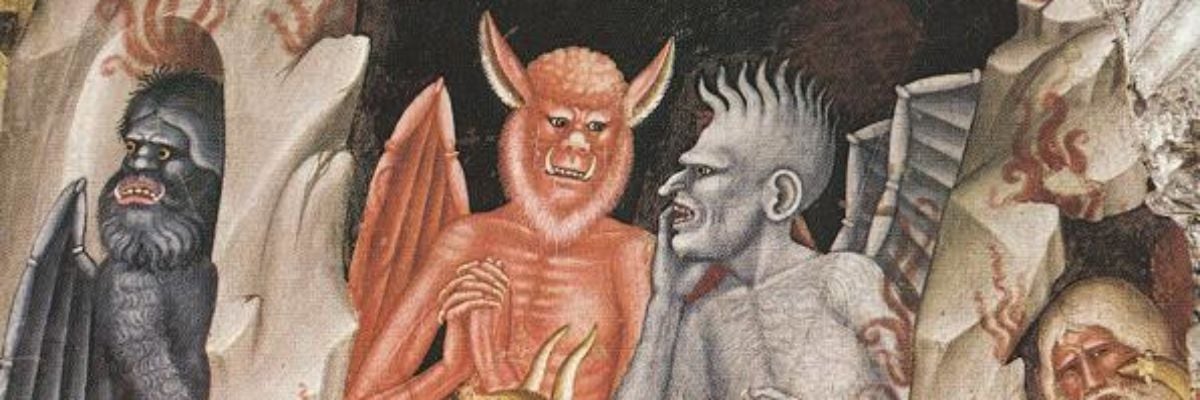
In this video, Catholic Answers Live Host, Cy Kellett, asks apologist Jimmy Akin what Catholics must believe about Demons.
Transcript:
Cy: There are topics where people would like to know, well, what do I have to believe as a Catholic? What is certain about a topic as far as the Catholic faith goes? And one of those is demons. We get a lot of questions about demons. There’s actually a lot of Internet conversation about demons among Catholics
Jimmy: A lot of which is poorly informed.
Cy: Yes, that’s right. And so that’s why we get this situation where there’s a lot of conversation. But do people actually know the basics of what the Church teaches on the topic? So, and then we’re gonna take this segment, the Bottom Line, and we’ll make it available on social media to help people who might need the basic Catholic teaching.
Jimmy: So thank you very much for taking the time to talk with me about demons. Before we go this afternoon, the first thing I would like to ask, I…
Jimmy: Would say you used two different concepts at the beginning of this segment. One of them was what does the Church teach? And the other is what is certain. And I would take what is certain to mean what’s infallible. And not all Church teaching is infallible.
Cy: That’s a good point.
Jimmy: So I will tell you what the Church teaches. I’ll also tell you if something’s infallible, and I’ll tell you what my opinion is on matters the Church does not have a teaching on, but are subject to opinion.
Cy: Very good. Very good. Well, is this a permitted opinion? Could I just say, because I do think lots of people in the modern world do say, look, all this New Testament, particularly talk about demons is really, you can interpret it metaphorically that we’re talking about human evil, the tendency towards evil and selfishness and all that. So can I, as a Catholic, hold the view that really demons are metaphors?
Jimmy: Well, the Christian Church has always held that they are not metaphors, that they are intelligent creatures of God. They are different than we are in that they don’t natively have physical bodies the way we do, although it’s been held very commonly as a matter of theological opinion that they can assume, like angels can assume, temporary physical bodies. These are sometimes called aerial bodies. The idea was that they would condense them out of air and then the air would dissipate when they were done using it. That’s not Church teaching. Like I said, that was theological speculation. But the Church has always understood that they are not metaphors, but are other creatures of God that are different than us.
Now, after the early 20th century and the mid-20th century, there was, you know, some… There was a period of doctrinal confusion, particularly after Vatican II. And there were some individuals who were promoting this metaphor idea. But when the Catechism of the Catholic Church came out, the Church reaffirmed its historic position. And so the Church teaches that demons are intelligences that God created without bodies. And they are not simply metaphors. So that is Church teaching.
Cy: I’m not going to ask you about what they are because I think most people do have the basic understanding that a demon is a fallen angel.
Jimmy: Well, there’s actually some interesting discussion there in biblical circles because it depends on how you use the word angel. It depends on what value you give to various Second Temple Jewish sources. In the Second Temple Jewish world, it was common to understand… Now by angel you just mean it’s not a human being. Well, okay, there’s… There was some discussion in early Second Temple Judaism about demons. And they weren’t actually always identified with what we would call a fallen angel, but with a subset of creatures that were the ghosts of individuals that were human-angelic hybrids. And this is found in the book of Jubilees and in First Enoch. And it seems to be the common understanding in Second Temple Jewish sources.
But eventually the term angel came to be used for any non-human creature that has smarts and is here on earth. And so by that understanding, demons would be fallen angels, regardless of whether they would have been classified under that term in the first century.
Cy: So I guess the question that people have then is why would they fall though? I mean, what could possibly have tempted a creature who… an intelligent creature that presumably has knowledge of the good? Why would they choose permanently to be separated from God?
Jimmy: Well, let me ask you a question. Why would you choose to be permanently separated from God? Is there any reason good enough to justify that?
Cy: No, no, there’s not a good enough reason. But there are reasons, I can see, I guess, where you could choose something lower and just say, I want power, I want money, or I want, you know, pleasure.
Jimmy: Or we’re in a similar situation with the demons. Ultimately there is no good reason. There’s nothing sufficient to justify turning your back on God. And so sin makes you stupid. And the demons did something stupid, even though they’re otherwise very smart, they could still do stupid things. Just like King Solomon, he was very smart, but he did stupid things.
In terms of what specifically was it that the demons fell over? We don’t know, because we’re not told in Scripture. And that’s led both Jews and Christians to speculate on what it would have been. One early speculation is that it involved mankind. And according to a Second Temple work known as the Life of Adam and Eve, the reason the devil fell was because God created man in his image. So God is the image of man. Sorry, man is the image of God. And what do you do with the image of a God? You reverence it. I mean, that’s what they did in the ancient world. They made images of God and then they would reverence them.
Well, okay, in the book of the Life of Adam and Eve, that’s the explanation. God makes man in his image. Michael, a good angel, tells all the other angels, okay, now we’re gonna all reverence the image of God. Together, we’re gonna reverence man. And the devil thought man… he’s this puny little thing, and I’m older than man. I shouldn’t be reverencing him. And that’s what led him to rebel.
There are also other speculations. A more particularly Christian speculation is kind of connected to that one. But it’s that the devil knew that Jesus was gonna incarnate as a human being, and he couldn’t put up with the idea of someone like Jesus incarnated as a mere lowly human. And that’s what caused the Fall. Then there’s the idea that it was pride on the devil’s part that he wanted to be like God. And this is based on a passage in Isaiah that’s actually talking about a human prince, a human leader. But many people have applied it to the devil and speculated that he wanted to knock over the establishment and take over heaven for himself, which, of course, he could never do since God is omnipotent.
So I’m a little personally skeptical of that idea. But there are various speculations on what may have been the cause of the Fall, but they are all just theological opinions.
Cy: All right, so then the practical question I’ll end with, then how do I avoid these demons and stay out of their evil clutches?
Jimmy: Well, you could try wearing a special, you know, a hazmat suit.
Cy: I’m willing if it’ll keep them away!
Jimmy: Failing that, I would pray to St. Michael the Archangel and say the St. Michael prayer and entrust yourself to God and not really think about him too much.
Cy: All right, Jimmy, thanks for giving us the bottom line on demons. As always, things that surprised me in what you have to say and very, very helpful. Thank you.
Jimmy: My pleasure.
Prayer to St. Michael the Archangel:
Saint Michael the Archangel, defend us in battle. Be our protection against the wickedness and snares of the devil; May God rebuke him, we humbly pray; And do thou, O Prince of the Heavenly Host, by the power of God, thrust into hell Satan and all evil spirits who wander through the world for the ruin of souls. Amen



